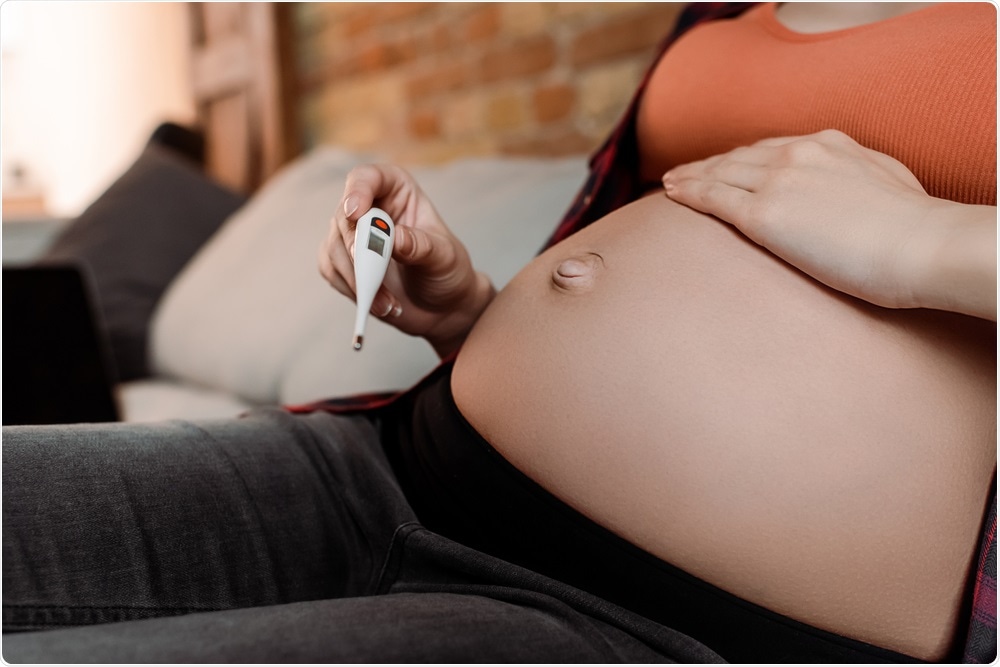Study reports a low prevalence of COVID-19 in pregnant women
by Angela Betsaida B. Laguipo, BSNNew data from two studies show the prevalence of severe acute respiratory syndrome coronavirus 2 (SARS-CoV-2) infection among pregnant women is low, but they still need to take extra precautions.
The first study, which was published in the journal JAMA Network, a team of researchers from Connecticut, revealed that there is only a 3.9 percent prevalence of coronavirus infection among women giving birth at three Yale-New Haven hospitals in the state.
Meanwhile, the second study published in the journal of Infection Control & Hospital Epidemiology reported that there is a 7.9 percent prevalence of the SARS-CoV-2 infection in pregnant women who manifested symptoms, and a 1.5 percent prevalence among asymptomatic carriers, or those without symptoms, at four hospitals in Boston.

Image Credit: LightField Studios / Shutterstock
The first study
On March 30, a Yale-New Haven Health hospital admitted a pregnant patient for childbirth. She developed symptoms of cough and fever after childbirth. The doctors prompted the woman to SARS-CoV-2 testing, and she was positive. To protect the healthcare workers and other patients, the hospital decided to screen and test all patients presenting for childbirth.
Between April 2 and April 29, the hospital screened and tested patients admitted for childbirth at three Yale-New Haven Health hospitals in southern Connecticut. Apart from testing with the SARS-CoV-2 polymerase chain reaction (PCR) testing of nasopharyngeal swabs, the patients also answered interview questions related to symptoms of COVID-19, history of travel, and contact tracing. For women scheduled for cesarean birth, they were tested at preoperative visits in the clinic.
Of the 782 patients presenting for childbirth, 1.5 percent were previously diagnosed with COVID-19. The remaining 770 patients tested upon admission, and 3.9 percent or 30 patients tested positive for SARS-CoV-2. Of these, 73.3 percent were asymptomatic. The overall prevalence of positive results among asymptomatic pregnant women was 2.9 percent.
Further, eight of the 14 patients or more than half of pregnant women with symptoms tested positive for COVID-19. On the other hand, among asymptomatic patients who tested negative, none developed symptoms that warranted further testing.
The study findings highlight the importance of testing and screening of pregnant patients given the high number of those who do not manifest symptoms of COVID-19.
Hospital policies urged everyone who enters the hospital to wear a mask. Universal mask use was implemented among health workers and patients, including the support person. Only one person could accompany the patient for childbirth.
When admitting symptomatic patients, the healthcare workers wore N95 respirators and appropriate personal protective equipment (PPE) until results come in. For asymptomatic patients, clinicians wore masks. However, when pregnant women are in the second stage of labor and delivery, the health workers wore full PPEs.
The second study
Boston followed New York as the state with a high prevalence of coronavirus disease cases, with 1,628 confirmed cases per 100,000 residents. This prompted the researchers to conduct a study on the prevalence of COVID-19 infection among pregnant women presenting to labor and delivery in the state.
To arrive at their findings, the team conducted testing and screening among pregnant women who presented for childbirth in three hospitals affiliated with Mass Brigham Health. On April 18, the institutions implemented universal testing on all women for SARS-CoV-2 using RT-PCR of nasopharyngeal swabs.
All pregnant women were also screened for symptoms of the coronavirus infection, including fever, cough, difficulty in breathing, sore throat, fatigue, colds, or loss of smell.
The team has found that of the 764 pregnant women hospitalized, 99.2 percent were tested. Of the 139 symptomatic patients, 7.9 percent tested positive, while 9 of the 618 patients who had no symptoms tested positive.
Findings also revealed that 45 percent of the patients who tested positive had no symptoms at admission. Further, none of the asymptomatic patients who had a positive result developed any symptom during the hospitalization. All of their babies tested negative for SARS-CoV-2 infection.
Based on the study findings, the rate of asymptomatic infections in pregnant women was lower than that of New York City, despite having a similar per-capita case count.
One of the reasons cited is the early testing of the Boston hospitals. They started testing more than 30 days after the state declared a lockdown. Also, Boston is less densely populated than New York.
The researchers highlight the importance of testing patients.
A recent study has shown that SARS-CoV-2 can affect the placenta of a pregnant woman, endangering the life of the fetus due to low oxygen supply. This means that they still need to take extra precautions as they may still contract the virus.
Source:
COVID-19 appears to attack the placenta in pregnant women - https://www.news-medical.net/news/20200526/COVID-19-appears-to-attack-the-placenta-in-pregnant-women.aspx
Journal references:
- Campbell. K., Tornatore, J., Lawrence, K. et al (2020). Prevalence of SARS-CoV-2 Among Patients Admitted for Childbirth in Southern Connecticut. JAMA Network. https://jamanetwork.com/journals/jama/fullarticle/2766650
- Goldfarb, I.T., Diouf, K., Barth, W., Robinson, J., et al. Universal SARS-CoV-2 testing on admission to Labor and Delivery: Low prevalence among asymptomatic obstetric patients. Infection Control & Hospital Epidemiology. https://www.cambridge.org/core/journals/infection-control-and-hospital-epidemiology/article/universal-sarscov2-testing-on-admission-to-labor-and-delivery-low-prevalence-among-asymptomatic-obstetric-patients/81002844FD1915D0A495B32F7B53ACB2
- Shanes, E., Mithal, L., Otero, S., Azad, H., Miller, E., and Goldstein, J. (2020). Placental Pathology in COVID-19. American Journal of Clinical Pathology. https://academic.oup.com/ajcp/advance-article/doi/10.1093/ajcp/aqaa089/5842018